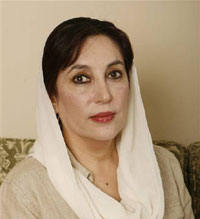US impels Pakistan to end Benazir Bhutto's house arrest
The United States impelled Pakistan to permit freedom of movement to Benazir Bhutto. Robert Gates, US Defense Secretary, said that the political internal problems there can undermine the fight against terrorism in Pakistan.

"We remain concerned about the continued state of emergency and curtailment of basic freedoms, and urge Pakistani authorities to quickly return to constitutional order and democratic norms," Gordon Johndroe, a spokesman for the National Security Council said in a statement.
"Former Prime Minister Bhutto and other political party members must be permitted freedom of movement and all protesters released," said the statement by Johndroe, who accompanied President George W. Bush to the president's Texas ranch for the weekend.
The administration said it is important for Pakistan's future that moderate political forces be able to work together to put Pakistan back on a path to democracy.
Gates, speaking to reporters earlier Friday on his plane en route home from a weeklong visit to Asia, said that the longer the political turmoil in Islamabad continues, the greater the risk that it will distract the battle against insurgents.
Gates thus voiced for the first time concerns that Gen. Pervez Musharraf's emergency declaration and the protests and arrests that it spawned could impact operations in Afghanistan.
"The concern I have is that the longer the internal problems continue, the more distracted the Pakistani army and security services will be in terms of the internal situation rather than focusing on the terrorist threat in the frontier area," said Gates.
On Friday, Pakistani police detained Bhutto at her Islamabad home and reportedly rounded up 5,000 of her supporters to block a mass protest against emergency rule.
To date, the Pentagon has said the unrest has had no effect on U.S. military operations. But Gates comments underscore the nervousness of the Bush administration, even as it continues to voice support for Musharraf as a critical ally in the fight against terrorism.
Musharraf imposed emergency rule last weekend and suspended the constitution, triggering widespread protests in his own country, and setting off a flurry of diplomatic efforts in Washington to get him to restore democratic rule.
After nearly a week, Musharraf yielded somewhat to pressure from the United States on Thursday and said Pakistan would hold parliamentary election by mid-February a month later than originally planned.
He still, however, has shown no sign of relinquishing his military post as chief of the army another key demand of opposition leaders and the Bush administration.
Gates, in his meeting with reporters traveling with him, echoed White House views that Musharraf has been a staunch ally, and praised his move to set a new date for elections.
"We said from the very beginning it's important to move back to constitutional processes as quickly as possible," Gates said. "I think that there is building pressure for him to take off his uniform if he continues as president. But I think that setting the date for the elections was certainly an important first step."
U.S. officials, including Bush in a personal phone call, pressed Musharraf to reschedule the election and drop his military role. And they said they planned to review U.S. aid to Pakistan, although they have said that funding for the fight against terrorism would not likely be at risk.
Since 2001, the U.S. has given Pakistan $9.6 billion (Ђ6.55 billion) in aid, and there is another $800 million (Ђ546 million) the administration is requesting from Congress in the current budget year.
In other comments, Gates said it is too soon to tell whether reports that Iran has stemmed its flow of weapons into Iraq represent a credible trend. But if it is, he said it is more the result of talks between the Iraq and Iran, and does not involved the U.S.
"At this point, at least, I see it more as being part of the developing relationship between the Iraqi government and the Iranian government rather than a signal to us, necessarily," said Gates, who is returning to the U.S. after a weeklong trip to China, South Korea and Japan.
He added that if the Iranians are indeed slowing or stopping their shipments of armor-piercing explosives and roadside bombs into Iraq, then it clearly will reduce U.S. and Iraqi deaths.
Subscribe to Pravda.Ru Telegram channel, Facebook, RSS!


